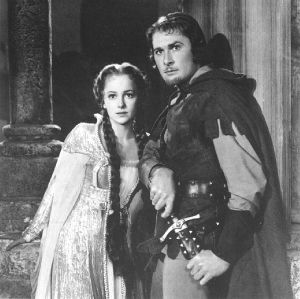Medievaloid: Difference between revisions
(links, formatting, SCAism) |
m (thumbnailed and moved amusing image) |
||
| Line 1: | Line 1: | ||
| ⚫ | |||
Something is '''medievaloid''' if it is not [[authenticity|authentic]] to the [[middle ages]], but looks medieval to the modern eye. |
Something is '''medievaloid''' if it is not [[authenticity|authentic]] to the [[middle ages]], but looks medieval to the modern eye. |
||
| Line 13: | Line 14: | ||
* [http://www.virtue.to/articles/1947.html Medievaloid Fashion of 1947] |
* [http://www.virtue.to/articles/1947.html Medievaloid Fashion of 1947] |
||
| ⚫ | |||
[[Image:Errolflynn.jpg]] |
|||
Revision as of 12:58, 29 September 2004
Something is medievaloid if it is not authentic to the middle ages, but looks medieval to the modern eye.
While many people, such as laurels and those concerned with authenticity, strive to create authentic medieval garb and other crafts, much of the material culture that makes up the SCA could be considered medievaloid.
Dresses bought in a fantasy or rennaissance faire store are usually medievaloid - they look medieval to the untrained eye but don't quite fit any one time, place or style. Other examples would be leather belts with a metal loop instead of a buckle, heraldic banners with modern symmetry, and the concept of everyone at a feast having a knife as the only utensil and drinking from pewter beer steins. The SCA's method of selecting its leaders by crown tournament is medievaloid.
In most cases, especially for beginners, medievaloid fits under the category of "best effort" and passes all but the most critical scrutiny. Where the line is between medievaloid and "just tacky" is hotly debated.
See also:
